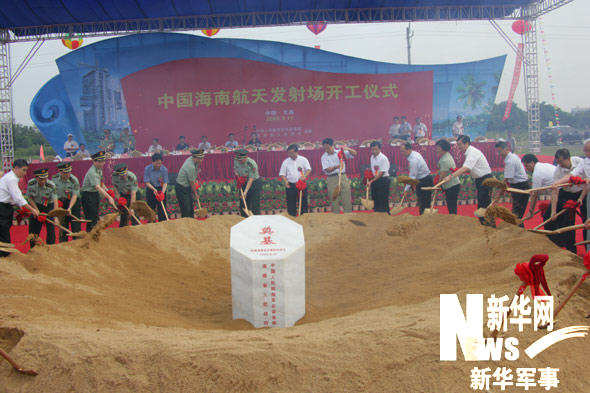 |
|
China Monday began construction of its new space launch center in Wenchang City, on the northeast coast of the tropical island province of Hainan, which is scheduled to be completed by 2013. [Xinhua]
|
China Monday began construction of its new space launch center in Wenchang City, on the northeast coast of the tropical island province of Hainan, which is scheduled to be completed by 2013.
The Hainan Space Launch Center, the fourth and the lowest latitude one in China, only 19 degrees north of the equator, would allow China to take part in more international commercial space launches, said Wang Weichang, director of the Hainan Space Launch Center Project Headquarters.
He said at the cornerstone laying ceremony of the center that the new launch site will be mainly used for launching synchronous satellites, heavy satellites, large space stations, and deep space probe satellites.
Wenchang, surrounded by coconut forests, is connected to Hainan provincial capital of Haikou by a 60-km expressway.
The coastal launch center will be able to launch rockets over clear sea for up to 1,000 kilometers, which can avoid the danger of burning wreckages falling into residential areas.
The center consists of a space launch port, a space theme park, a rocket assembling plant, a rocket launch base, and the command center.
The center is designed to handle up to 10-12 rocket launches a year, according to Wang.
He said China's current three space launch centers in Jiuquan, Taiyuan and Xichang, all landlocked in western plateau and mountainous regions, lack commercial development and are inconvenient for transportation.
Long Lehao, a carrier rocket expert with the Chinese Academy of Engineering said the Wenchang launch center would increase the payload mass of Chinese rockets by more than 300 kg, 7.4 percent more than that from the other three centers.
He explained that rockets to be launched from Wenchang would consume less fuel to get into orbit, because of its better location.
"A satellite launched from Wenchang will be able to extend its service life by three years as a result of the fuel saved from the shorter manoeuvre from the transit orbit to the geosynchronous orbit," he said.
The State Council, the country's Cabinet, and the Central Military Commission approved the new space launch center in August 2007.
Liang Xiaohong, vice president of the China Academy of Launch Vehicle Technology said earlier this year that the center is likely to be the launch base for China's new-generation Long March 5 large-thrust carrier rocket, which is currently under development and scheduled to be put into service in 2014.